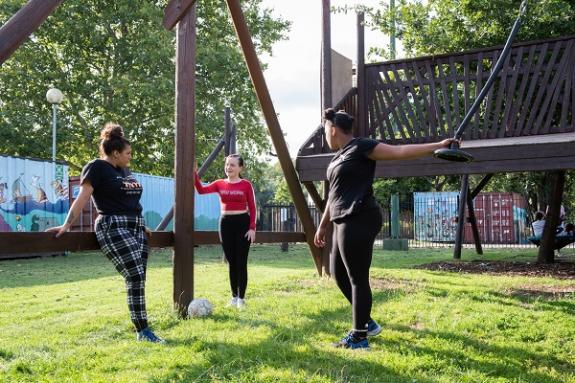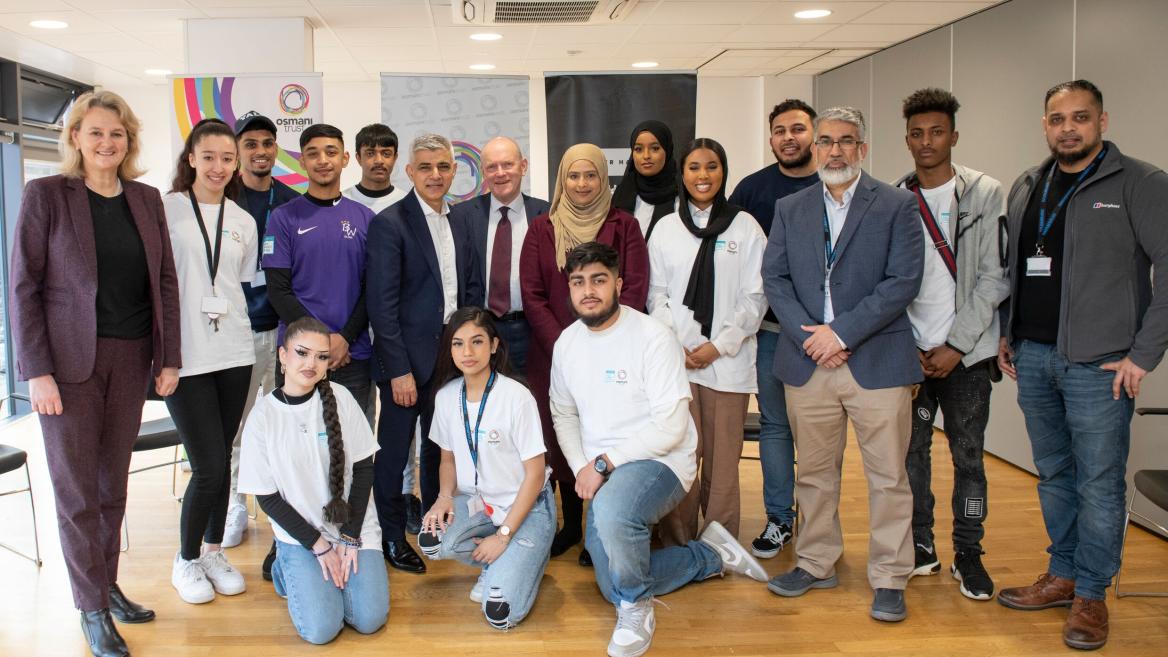
Updates from the team behind 'A New Deal for Young People'
Read what the team behind the mission on 'A New Deal for Young People' have been up to. They'll regularly update this blog with the latest news and developments.
March 2022: £7.2m to fund mentoring for young people

In February, the Mayor announced an investment of £7.2m to fund mentoring for young people.
The money will help experienced local organisations provide mentoring for the young people who need it the most.
£4.8m of this investment will fund three mentoring programmes:
- Mentoring Leaders
- STEAM Mentoring
- HeadStart Action.
An additional £2.4m from the Violence Reduction Unit (VRU) will fund a three-year mentoring programme. This is part of the VRU’s ongoing efforts to reduce school exclusions.
Here on Talk London, Young Londoners have told us about how mentors and role models have transformed their lives:
- “Without the people around me I don’t know who I would have become.”
- “They helped me find my answer, and allowed me to gain a level of understanding.”
- “Mentoring gives you the guidance and the confidence you need to reinvent and develop yourself to go after what you want in life.”
- “As if by magic, [my mentor] helps you to become a better version of yourself.”
You can read more from young people about the positive impact of mentoring.
More about the New Deal for Young People mission
The New Deal for Young People mission will ensure that by 2024:
- all young people most in need of support will be entitled to a personal mentor
- all young Londoners will have access to quality youth activities.
You can read more about the background to the New Deal for Young People mission.
You can get in touch with the New Deal for Young People mission at [email protected].
Keep an eye out for our emails with updates from this mission.
Not yet signed up for Talk London? Please register below – it only takes a few minutes.
March 2021
“A mentor needs to be plugged in”: An interview with young Londoners on youth services.
Copyright for the drawing - Akhila Krishnan
What works and what doesn’t in youth services? And what change do young people want to see in London?
To find out more about areas of future development, we interviewed members of the Young People’s Action Group, who have been working with the Violence Reduction Unit (VRU) since June to develop a youth-led engagement strategy.
There’s been some talk about the importance of having mentors who you can trust. What do you see as essential when it comes to mentors?
A mentor needs to be plugged in. It has to be someone who can organise a conversation. Mentors need to be people with experience of housing, unemployment, depression, anxiety, PTSD. Young people need mentors they can relate to, people with lived experience who have been in the same place as them.
What areas of the mentor relationship need more attention?
It seems as if no one wants to hear about your personal mental health. There’s no one to talk to. There’s still a negative stigma about asking for support. There needs to be more emphasis on a mentor to help us young people open up more and not keep things bottled up, but the work mentors do or the support they can give is limited.
Young people should be able to call a free number and get referred to another contact. A call-line would be simple way to help. Most people don’t know about the mental health call-lines, and the NHS call-line.
Every young person who has attended a PRU or is in one should have a mentor, they need that extra support bubble, and the conversations between us and a mentor should be kept confidential unless the mentor feels that we are at risk.
There are organisations who do mentoring without knowing it, like youth clubs. They accidentally mentor people. Clubs with a nice friendly and nurturing environment can be a mentor. Maybe it’s about helping to give accreditation to clubs already doing that work.
Copyright for the drawing - Akhila Krishnan
What changes would you like to see the VRU and GLA make to strengthen mentorship and support services?
Mentors need to be delivering on promises. You should allow young people to interview the mentors before they’re hired, and every three months the young people should evaluate the mentors.
Support services should have a paid youth ambassador, to communicate between staff and young people. They can feed back if they’re having problems with a child or facilities. It’s very crucial that [the ambassador] is someone youthful, someone who’s been in the same place as them and can guide them somewhere else and have conversations along the way.
If you were in charge of the money, what would you fund to create more effective youth services?
- Dreaming development. Invest in young people’s dreams. Ask young people with a survey of what they want to do, provide the opportunity to exercise their passions. It could be a talent show, anything. That will support young people with mental health and depression too.
- Working in an area that has a influence. Central London is a very different area. Put money towards building youth centres in nice areas, and give opportunities in law, real estate, accounting. This can contribute to making us want to work towards something visible and achievable.
- Mentoring programme. We need more mentors that have come from backgrounds that young people can relate to, understanding that it’s a long-term relationship and not a hobby and something you turn off once funding is finished. Consistency is key.
- Wage is a form of respect. Being respected for your time. Young people, across all areas of work in the capital and elsewhere, should all be paid, fairly for their expert opinions and knowledge, just like everyone else.
- Change the curriculum. Teach young people how to effectively plan the things they want to achieve, then match youth with opportunities. We had finance managing at school, but it was a video and you just sit there – it was so ineffective. It has to be delivered in the right way. More funding towards support from someone who specialises in mental health and sexual health too.
- Money into housing in different boroughs that is open to young people that are struggling. One main issue is toxic environments in the home. Money should go to sustain something like university accommodation, somewhere to go to leave a toxic environment.
- Companies and mentors should provide real opportunities, like help with CVs and training. Organisations need to look at potential of young people, not just what they already are. Lots of opportunities don’t take into account the needs of the young person.
Are programmes like the Youth Action Group helpful? How should young people be involved going forward?
Definitely sustain programmes like this. There are so many benefits from being involved – being provided technology to work from home and paying you so you get to provide for yourself. This programme is amazing.
Help young people to develop their own brands. Each person on this programme is passionate to change London in different ways. Help them become not just youth consultants for the GLA but representatives of themselves to work as consultants after the programme is over.
Young people should have access to decision-makers, especially with things that directly influence young people. Listen to young people’s voices. Often you submit questions and they don’t get through. Young people should be asking politicians questions in the House of Commons, at least once a month. Cries turn to crime and young people need to be heard.
Finally, what questions do you have for the GLA and for London?
- What is the actual plan to change London? And how can we get involved?
- How do we bring about the changes that we want to bring about?
- Apart from new buildings, what change has there actually been in London?
- How do you hold people to account to deliver on promises?
- How are you going to support young people to share their views?
Copyright for the drawing - Akhila Krishnan
Thank you to the Advisory Group members for sharing their learning, and their ideas for future development. The conversation continues.